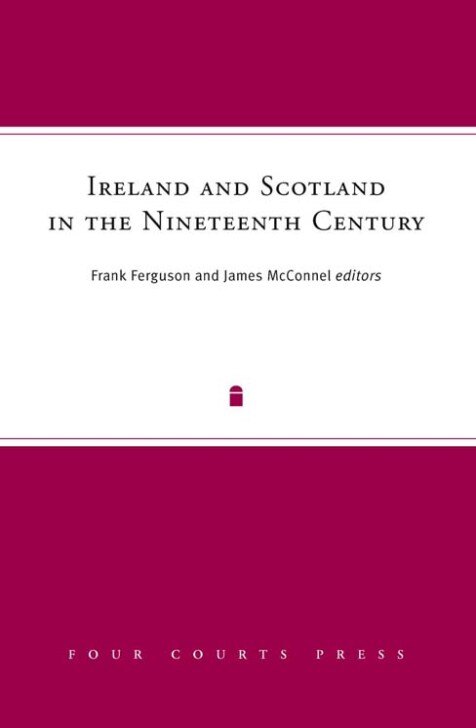Ireland and Scotland in the nineteenth century
Frank Ferguson & James McConnel, editors
'This wide-ranging collection of twelve essays complicates the stabilities of the Victorian age in Ireland and Scotland. Its authors, many of them early career academics, consider topics as variant as tourism, agricultural technology, economics, tuberculosis, and sectarian parades. A number of chapters make significant contributions to their individual fields of study … Peter Gray’s investigation of “Thoams Chalmers and Irish Poverty” is a masterful discussion of an unjustifiably overlooked theme in nineteenth-century Irish-Scottish relations, and Patrick Maume’s essay, “From Scotland’s Storied Land: William McComb and Scots-Irish Presbyterian Identity”, provides a thorough and insightful analysis of one of the period’s most widely read representatives of this distinctive confessional and cultural tradition … there is much here to consolidate recent gains in Irish-Scottish studies, and the editors should be congratulated on overseeing such a rich and varied account of cultural dissonance and identity formation in nineteenth-century Scotland and Ireland', Crawford Gribben, Victorian Studies (Winter 2010).
'In Ireland and Scotland in the 19th century, Frank Ferguson and James McConnel have brought together 12 distinctive essays, published in association with the Society for the Study of Nineteenth-Century Ireland, bringing together academics from across the UK, Ireland, the US and Canada to explore the relationships between the peoples separated (and united) by the north Channel .... In adopting a cross-disciplinary approach, Ireland and Scotland in the Nineteenth Century questions received ideas about the extent of cultural harmony between the two countries, arguing instead that conflict and difference were central themes in 19th century Irish-Scottish relations. All-in-all a captivating read that will appeal to any discerning reader of Irish and Scottish history', Darryl Armitage, News Letter (2009).
‘The relationship between Ireland and Scotland has a long history of cross-immigration, from the first Irish raiders on the Scottish coast to the settling of the Orange men in Ulster. A common Celtic heritage has not, however, resulted in unity. Ferguson and McConnel present essays that cover a variety of aspects in the nineteenth century relationship between Ireland and Scotland. Several authors examine the Irish Presbyterians, outsiders to both Catholics and Anglicans and still important in the social dynamics of Ireland. The reception of Irish immigrants in Scotland is discussed by others, especially the tension between the Orange and the Green, which could spill into violence. Even Scottish Catholics were not eager to associate with Irish coreligionists. Articles on tourism, literature, medicine and agriculture round out this survey of the uneasy relationship of the cousin-countries’, Book News (May 2009).
‘Although an academic book written for academics this is an interesting collection and shows us that there is more to the Irish-Scottish connection than the Plantation of Ulster and football clubs’, Books Ireland (March 2009).
‘This volume gathers together a diverse mix of themes from twelve authors who set out to disseminate new research and fresh perspectives on the links between Scotland and Ireland during the long 19th century. Religion, national and regional identities and politics inevitably play a large part in such an endeavour, but the results of the writers’ deliberations debunk some of the well-established beliefs and perceptions … this is a volume where most of the contributions stand nicely on their own, making it easy to dip into while providing a stimulating range of new insights and interpretations. It is one of several recent works that strengthen the historical connections between Ireland and Scotland while challenging entrenched perceptions of old', Iain C. Hutchison, History Scotland (November/December 2009).
‘An interesting and informative book which throws new light on aspects of Scottish and Irish history', Tony Canavan, Books Ireland (April 2010).

